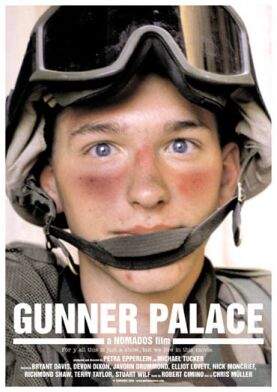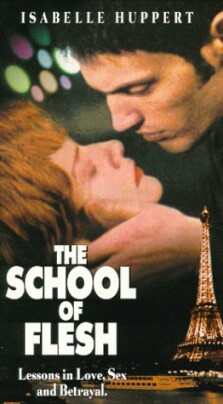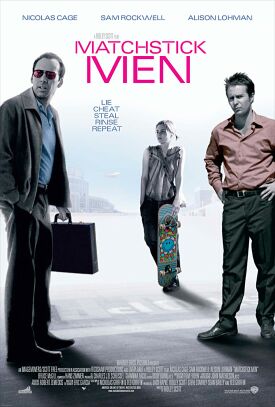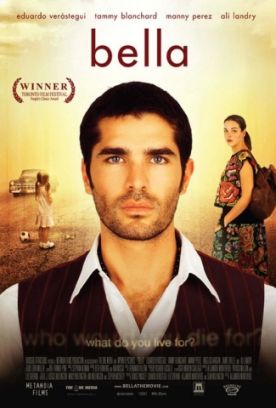Gunner Palace
Movies may or may not show us images of reality. The point is always debatable. What is beyond doubt is that reality is shaped by the movies.”The Sopranos” showed us gangsters learning how to be gangsters from watching The Godfather movies. Likewise, Gunner Palace, by Michael Tucker and Petra Epperlein, shows us soldiers learning how to be soldiers from Vietnam movies. Tucker and Epperlein, who are real life husband and wife, aim to help them along. In one sequence they show their subjects — the “gunners” of the 2/3 Field Artillery headquartered during the period when Mr Tucker and his camera dwelt among them in a Baghdad palace formerly belonging to Uday Hussein — going on a 3:00 AM raid to the accompaniment of Wagner’s “Ride of the Valkyries.” We hear it first on the soundtrack: an advertisement that the filmmaker is making the link with Apocalypse Now and therefore to Vietnam and the gung-ho military attitude popularly supposed to have been forever discredited there. But then we hear the same music on a makeshift stereo belonging to the men themselves as they mount up for their raid. They, too, have learned how to connect themselves with the Vietnamese futility, except that, for them, acting like crazy Colonel Kilgore in Francis Ford Coppola’s movie is a source of perverse pride.
Perhaps Mr and Mrs Tucker see their movie as playing the role in public perceptions of Iraq that Coppola’s played in relation to Vietnam, but it has to be said that the material their documentary has to work with is a good deal less impressive than that of the fictional film.”A good day at ‘Gunner Palace’ is one where nothing happens,” the film tells us, and we can well believe it. But a good day for movie-makers is one where lots happens and, unfortunately for the Tuckers, they didn’t get many such days in the filming of Gunner Palace. Mr Tucker goes along on a couple of raids, and he films the grunts doing rap, having a pool party or watching movies on their laptop computers in their leisure hours, but somehow he manages to catch on film little more action than the arrests of a few terrified Iraqis.
He can only tell us about the constant danger the men are in but we see little or none of it. It’s true that one of the guys he filmed was killed shortly after his first stint of filming, but the Tuckers were tucked up in their bed back in Germany by that time. After the end of what President Bush described as “Major Combat,” Mr Tucker says he “witnessed the slow rise of what US soldiers jokingly defined as ‘Minor Combat’: random firefights, snipers, roadside bombs and rocket attacks.”
Too bad he didn’t have his camera with him when he did.
But then he didn’t really need it. He already knew what he wanted to say. As in so much of the journalistic commentary on the war, the allusion to Vietnam is simply a statement of anti-war feeling that corresponds to no visible and non-cinematic reality. Doesn’t everyone already know that Vietnam was a stupid, immoral, crazy war? Well, we learn, Iraq is like that. But the anti-war stuff, when looked at closely, is pretty superficial. What better name than “Minor Combat,” for example, for what is going on in Iraq? The film-makers seems to think this satirical, and perhaps the men do too. Why wouldn’t they? Because of course no combat is minor if you’re the one being killed or wounded in it.
But that just underlines the problem with this film, which is that limiting the focus to the ordinary soldier’s point of view makes it nearly impossible for the audience to make any sense of what it is seeing. Who wouldn’t be anti-war without some sense of the big picture that the war’s planners and commanders presumably had in view when they sent the troops into action? All wars look chaotic and stupid from the middle of them. That’s what is meant by “The Fog of War.” In the middle of a battle, everyone experiences terror and confusion. It is only once you get outside it a little ways that anything has a hope of making sense. But if your purposes are political, it makes sense to show only the emotions of soldiers who have recently been in dangerous situations and who expect to be in them soon again. The soldiers themselves, encouraged to express these emotions, are easily led into a very cinematic kind of self-dramatization, if not self-pity, which is naturally exacerbated by the presence of the camera seeking, as cameras always do seek, something that looks like authentic emotion.
For this purpose, rap is also a particularly appropriate art form, and the film-makers employ shots of more than one soldier performing a rap lyric. Again, the merit or lack of it of these poetic effusions is really beside the point. All that matters is that it belongs to a style of declamation that is conventionally supposed to convey authentic feeling. Yet one person’s feelings are no more likely to be more authentic than another’s just because they are put into rhyming — or, more usually, half-rhyming — form. It used to be thought honorable for those who had suffered in war to make light of the fact, or else to shut up about it. Now it is apparently more honorable for them to “rap” and complain.
What more needs to be said about this film or the media approach to the war which it represents? The anti-war mentality presumably sees progress in this evolution of honorable standards, but perhaps not everyone will agree.
Discover more from James Bowman
Subscribe to get the latest posts to your email.








